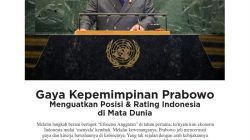Indonesiantalk.com — PERHUMAS INDICATORS: INNOVATION BENEFITING CUSTOMERS DRIVES LEAPS IN TRUST AND CORPORATE REPUTATION
Boy Kelana Soebroto, MCIPR, the Chairman of the Indonesian Public Relations Professional Organization (PERHUMAS), has emphasized that companies that innovate and provide the greatest benefit to their customers and society will drive significant improvements in trust and corporate reputation.
Such companies can sustain the relevance of their products and services over time. Boy Kelana made these remarks during the launch event of the organization’s research product, “PERHUMAS Indicators,” held in Jakarta on Monday, September 18.
PERHUMAS Indicators is the result of a study on trust and reputation in industries and organizations that incorporate communication policies into their top management to support their success.
“The PERHUMAS Indicators study is an innovation by PERHUMAS to demonstrate that the public relations profession can significantly assist top management in crucial decision-making for the success of a company or institution,” said Boy Kelana, who also serves as the Head of Corporate Communication at Astra International.
According to Boy Kelana, it is time for both the public perception and executives to recognize that public relations is no longer just a support function but an integral part of top management, acting as strategic thinkers. Thus, the role of public relations has evolved from being a mere call center to becoming an essential component of a company’s operations, contributing to profit generation.
PERHUMAS Indicators serves as evidence to elevate the bargaining position of corporations, government entities, and organizations by assessing their ability to implement research-based communication policies, particularly in measuring trust and reputation. Ultimately, all communication activities in business and government aim to build trust, which leads to reputation.
Earlier, during the Indonesian Public Relations Convention (KHI) held in Semarang on September 1-2, PERHUMAS officially launched a research product focused on trust and reputation in business and government activities. This research product, named PERHUMAS Indicators, measures the dimensions of trust and reputation across eight main indicators in these two dimensions.
The eight trust and reputation indicators include (1) performance management quality (PMQ), (2) Environment, Social, and Governance (ESG), (3) Innovation, (4) Leadership, (5) Technology, (6) People Management, (7) Communication, and (8) Crisis Handling.
PERHUMAS Indicators revealed that public trust in private companies, government, and institutions remains relatively strong, with scores above 65%. While trust in the government is high (67%), there is room for improvement to ensure that development programs run smoothly and sustainably.
It is evident that the government is making efforts to establish a professional culture in its bureaucracy with the aim of increasing public expectations and support, including its communication policies. Meanwhile, the private sector (76%) and state-owned enterprises (73%) need to actively collaborate without dominance to accelerate the nation’s welfare development in partnership with the government.
One notable factor in the government sector’s strength lies in its leadership dynamics, which significantly influence performance and, consequently, public trust.
Specifically, PERHUMAS Indicators examined the strengths and weaknesses of the private sector and state-owned enterprises across the eight trust and reputation indicators. The private sector and state-owned enterprises excel in the innovation category, with both receiving high trust scores: the private sector at 75.5% and state-owned enterprises at 69%.
The private sector is perceived as being better at implementing innovation, being more dynamic, and quickly seizing opportunities to develop products and services that meet customer needs. However, state-owned enterprises, especially in the banking and energy sectors, are better positioned to compete with the private sector, although there is still room for improvement in fostering innovation across other state-owned enterprises.
Another important indicator is crisis management, where both sectors scored below 70%, indicating an awareness of the significant negative impact of crises but also a need for more effective mitigation strategies, considering the complexity and uncertainty posed by globalization.
The threat of crises compels both the private sector and state-owned enterprises, including the government, to continually update their mitigation systems and crisis prediction capabilities (early warning systems). Additionally, they must build cross-sectoral coordination to minimize the impact of larger crises or disasters.
Overall, the private sector achieved an average score of 69% across all crisis sub-indicators, while state-owned enterprises averaged 65%. It is worth noting that a crisis management culture is more prevalent in the private sector, while state-owned enterprises often receive government support.
This research involved a team of public relations and communication practitioners from various sectors, including Benny Butarbutar, IAPR as the coordinator, Dr. N. Nurlaela Arief, MBA, Dr. Dian Agustine Nuriman, M. Ikom, IAPR, Richele Maramis, Glory Oyong, T. Marlene Danusutedjo, IAPR, and Anggia Bahana Putri.
PERHUMAS Indicators utilized a mix-methodology approach and engaged over 1,000 respondents from across Indonesia, with a margin of error of approximately three percent, ensuring comprehensive and reliable results.
About PERHUMAS The Indonesian Public Relations Professional Organization (PERHUMAS) is a professional organization for public relations and communication practitioners in Indonesia, established on December 15, 1972.
PERHUMAS is officially registered with the Ministry of Home Affairs as a national public relations organization in Indonesia and is affiliated with the International Public Relations Association (IPRA) based in London.
PERHUMAS aims to enhance professional skills, expand and deepen knowledge, foster networking and exchange of experiences among its members, and collaborate with kindred organizations both domestically and internationally.








